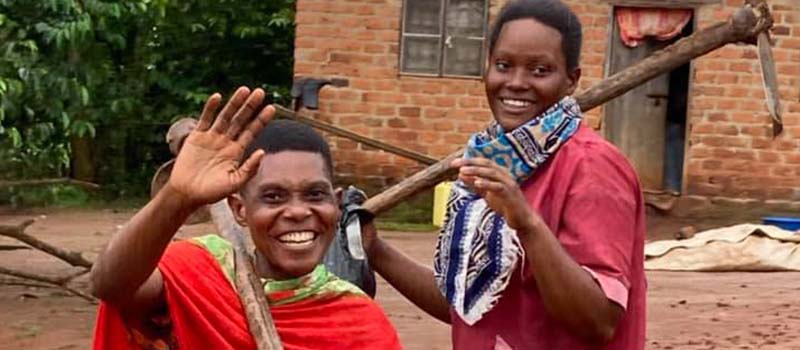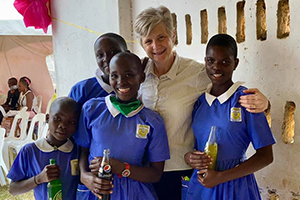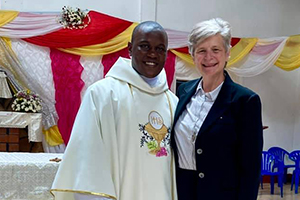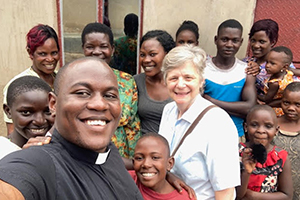My Perspective: Reflections from a grateful Mzungu

By Katie Mitchell, Franciscan Sister of Perpetual Adoration
Uganda will always have a special place in my heart. Long before I went there, when the Ugandan seminarians shared reflections about their beautiful country with me, I felt a stirring. So when they asked me to be the faculty representative for Mundelein Seminary (in Chicago, Illinois) at their ordination in Uganda, I felt particularly blessed. My joy multiplied when they invited me to spend more time with them in their villages and travel to some of the remote mission parishes.
I am grateful for the blessing of going to Uganda, my first time in Africa, and experiencing such a vibrant, faith-filled people. Uganda may be known for its natural beauty and safaris, but on a far more profound level — for those willing to engage in an authentic encounter — you can discover the deeper, cultural richness of the country and the serene, friendly and welcoming Ugandan people who prioritize relationships and the needs of others.
Although I saw the big, bustling city of Kampala on several occasions, my time was mostly spent in rural villages. I learned to make friends with “matoke,” which in English means “boiled and mashed plantains” and is the “daily bread” for many. In Kijjomanyi, a village without electricity, I was blessed to be with the children in their crowded, dark classrooms. People spend much of their time fetching water from faraway places and washing clothes outdoors, cooking for long hours over open fires, walking long distances on the muddy dirt roads and looking for work to provide for their families. The people have a deep sense of togetherness and find time to dance, to chat, to receive an unexpected visitor and to welcome one or two more at the table.
Wherever I traveled, Ugandans wanted to say hello, have a conversation and make introductions for me. Smiling groups of children and others often called after me “mzungu!” meaning “white person.” At first it was a little disconcerting, but I soon began to understand that Ugandans are genuinely curious and excited to see a mzungu. They want to engage and possibly make a new friend. In the villages it is a novelty to have a white visitor. All relationships in Ugandan society are deeply treasured and nourished, including those with foreign friends. Extended family and friends are often considered brothers and sisters.



Photos courtesy of Sister Katie Mitchell
Although English is the official language of Uganda and is taught in schools, the Ugandans I met spoke Luganda and most of the adults knew little English in the villages I visited. Children are learning but may be shy to try their English. While there I was able to learn some phrases in Luganda, and when I greeted groups of people in Lugandan they clapped and cheered.
From attending Mass and celebrations to dancing with Ugandan children and having conversations with wonderful people in rural villages, my days in Uganda were full. I spoke to many classes of elementary and secondary school children, visited health clinics, orphanages and youth centers, gave out religious articles, clothes and books that I brought with me and visited with village families. I rode to places on the “boda bodas” which are the motorbikes for hire. It was the rainy season in Uganda and often, by the time we arrived, we were soaking wet and covered in the distinctive Ugandan orange-colored mud … but smiling!
Ugandans are very busy working, cooking and raising children … yet no one is in a hurry. Schedules are very flexible. They show infinite patience and always seem to have time for others. With long lines of people waiting to go to confession, Mass scheduled to begin at 9 a.m. might start late and run long with lengthy speeches given at the end (I was asked to say a few words, too). Yet everyone waits patiently. They show genuine joy to be there and express their faith in a communal way: children sing, people drum and dance and meals are shared together afterwards. The church is the heart of the village, and everything takes place there.
This mzungu found people who are rich in so many ways: rich in gratitude and joy, rich in selflessness and generosity, rich in genuine love for God and others in Uganda. “Weebale Nnnyo Uganda” … “thank you very much Uganda.” You will always have a place in my heart!
